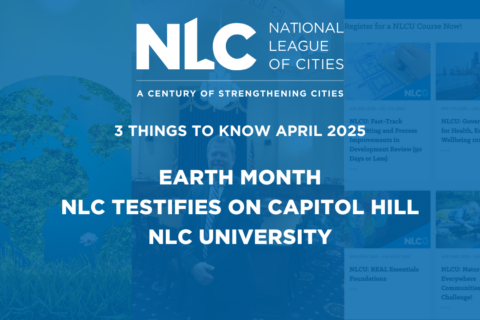Cities, towns and villages play a pivotal role in shaping energy policies that affect their communities. To make informed decisions, local leaders must understand the benefits, challenges, and applications of various energy resources. Making strategic energy investments can reinvigorate small town economies, attract new businesses, and build sustainable communities for future generations.
The National League of Cities has crafted five fact sheets on technologically progressing energy resources, such as geothermal, nuclear, hydrogen, batteries and energy storage, and carbon capture and storage, to aid local municipal leaders in making informed decisions toward achieving sustainability and development goals.
Geothermal Energy
Geothermal energy harnesses heat from the Earth’s interior to generate electricity and provide heating and cooling. Local officials should recognize that geothermal resources vary by location, with some regions having greater potential for development than others. For example, many small towns in the western U.S. sit atop geothermal hot spots. Understanding geological conditions and feasibility studies are crucial for assessing viability.
Benefits
- Renewable and environmentally friendly: Geothermal energy produces minimal greenhouse gas emissions and requires little land compared to other renewables.
- Baseload power: Geothermal plants can operate continuously, providing a stable source of electricity.
Considerations
- High initial costs: Exploration and drilling expenses can be significant, requiring substantial investment.
- Geological risks: Uncertainties such as resource depletion or seismic activity may affect the project.
- Regulatory hurdles: Permitting and zoning regulations can pose challenges to geothermal development.
Nuclear Energy
Nuclear energy generates electricity through controlled nuclear reactions. Despite some controversy on its safety, it remains a significant low-carbon energy source in the U.S.
Benefits
- Low carbon emissions: Nuclear power plants produce minimal greenhouse gases, helping meet sustainability efforts.
- Reliability: Nuclear plants provide stable electricity, reducing dependence on fossil fuels.
- Energy independence: Nuclear energy decreases reliance on imported fuels, enhancing local and national energy security.
Considerations
- Safety concerns: Nuclear accidents can have catastrophic consequences, requiring that stringent safety measures are met.
- Waste management: Proper disposal of radioactive waste remains a challenge, requiring long-term solutions.
- High upfront costs: Building and decommissioning nuclear facilities involves significant capital investment.
Hydrogen Energy
Hydrogen energy involves using hydrogen as a clean fuel for transportation, heating, and electricity generation. Local officials should understand production methods and applications. Agricultural communities could benefit from hydrogen as an emissions-free fuel for farm equipment and operations.
Benefits
- Clean fuel: Hydrogen use in fuel cells produces only water vapor, reducing air pollution.
- Versatility: Hydrogen can be produced from various sources, offering flexibility.
- Energy storage: Hydrogen fuel can store excess energy produced when renewable energy production is high, aiding grid stabilization.
Considerations
- Most current hydrogen production relies on fossil fuels, emitting carbon dioxide.
- Establishing hydrogen infrastructure requires significant investment.
- Hydrogen technologies are still developing, with cost and efficiency improvements needed.
Carbon Capture and Storage (CCS)
CCS technologies capture and store carbon emissions, aiding climate mitigation efforts by reducing atmospheric concentration of CO2, one of the main greenhouse gases.
Benefits
- Emissions reduction: CCS significantly reduces greenhouse gas emissions. If deployed at a large enough scale, it would have global benefits.
- Industrial decarbonization: CCS enables carbon-intensive industries, such as concrete and steel production, to decarbonize operations more quickly as opposed to completing redesigning production methods.
Considerations
- Enhanced oil recovery: Captured CO2 is often used to increase oil production by being pumped into geological deposits to displace and release hard-to-drill oil.
- Technological maturity: CCS is quite new and requires further development and cost reductions.
- Storage capacity: Identifying suitable storage sites and ensuring they don’t leak poses safety and environmental concerns.
Batteries and Energy Storage
Batteries and energy storage systems play a crucial role in integrating renewables and enhancing grid resilience. Remote small towns prone to power outages, can especially benefit by deploying battery storage to ensure backup power for essential services during adverse weather.
Benefits
- Grid stability: Energy storage balances supply and demand, improving reliability.
- Renewable energy interconnection: Battery storage enables more integration of renewables into the grid.
- Backup power: Energy storage provides backup during outages, enhancing resilience.
Considerations
- Cost and scalability: Large-scale deployment may be economically challenging.
- Environmental impact: Battery production, such as the mining of lithium and disposal, raises concerns.
In summary, local elected officials from communities of all sizes need a comprehensive understanding of emerging energy resources to formulate effective energy policies in their local jurisdiction. By weighing the benefits and considerations of each resource, policymakers can make informed decisions that promote sustainability and address the unique needs of their communities.
Dig Deeper
Want to learn more about one or more of the emerging energy resources? NLC’s Emerging Energy Resource Series offers clear and condensed information to help city leaders make informed decisions about their community’s energy future.









